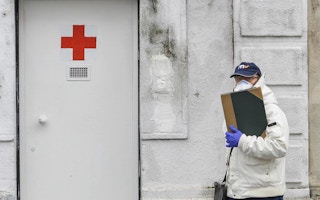Coronavirus has disrupted everyday life throughout the world through travel bans, flight restrictions and the cancellation of sporting and cultural events.
More than 10 million Italians have been banned from travelling, and all public events cancelled. In China, 30 million people are still under lockdown, allowed to leave their homes only every two days. The Japanese prime minister has requested that all schools close for the entire month of March, while the Italian and Iranian authorities have closed all schools and universities.
Despite the costs and inconveniences these actions impose, the general public is generally quiescent, even approving.
But coronavirus is not the only global crisis we face: the climate crisis, as others have noted, is expected to be more devastating. Some have observed that the response to the two crises is starkly different. As an expert in behavioural sciences, I have been giving some thought to what explains this difference.
At first glance the difference is surprising, because the climate crisis is structurally very similar to the coronavirus crisis for a number of reasons:
-
Both are characterised by an escalating probability of disaster. In the case of COVID-19, the disease caused by the coronavirus, this is due to the nature of contagion: each patient can pass the disease on to more than one person and so rates of infection tend to accelerate. In the case of climate change, the increased risk of initiating feedback loops (processes which amplify the warming trend) and crossing tipping points as global temperatures rise have the same effect.
-
Tackling either problem will disrupt our lifestyles in a number of ways, some of which are quite similar — consider the drastic rise in staycations elicited by the coronavirus crisis.
-
In both cases there is a coordination problem: the efforts of any one individual will achieve nothing to mitigate the risk unless accompanied by efforts from many others.
-
And in both cases, authorities acknowledge the urgency of acting. Governing administrations in 28 countries have declared a climate emergency.
Close to home
Given these similarities, one might think that both would evoke similar responses. But the response to the coronavirus crisis has arguably been far greater than the response to the climate crisis. Why?
Coronavirus is a recent, self-evident and rapidly escalating threat. It feels like a shock to the status quo, and the unease that shock engenders motivates action. Each day brings new evidence of the direct consequences of the outbreak, and these consequences are rapidly moving closer to home. It impresses as a clear and present danger that requires action now.
The threat of climate change, on the other hand, has been suggested for decades, and hard evidence has accumulated only gradually. Consequently, it does not evoke the same kind of unease.
While there is no doubt that present and past activities by humans have generated emissions that will have consequences for the climate, it is not wholly possible to ascribe any specific event to climate change. The impression it makes is of a vague problem that will be encountered in the future, not something immediate.
“
In both cases there is a coordination problem: the efforts of any one individual will achieve nothing to mitigate the risk unless accompanied by efforts from many others.
There is also a sense in which the future is going to be bad regardless what steps we take now to address climate change. This can beget feelings of helplessness. With coronavirus, it feels as though today’s actions will have real and demonstrable consequences.
People are more supportive of policies if they can explain the mechanism through which the policy operates. There is a simple and intuitive mental model of how COVID-19 spreads (through people) and how we can stop its spread (keep infected people isolated).
Though we have been taught that heating our homes, driving our cars and so on contributes towards climate change, the causal chain through which this actually occurs is not intuitive. It feels as though we are dealing with coronavirus effectively when we quarantine infected people, but it does not feel as though we are taking a concrete step towards dealing with climate change by, for instance, banning the burning of unseasoned wood.
Some hope
So, what lessons can we learn from this?
Communication appears to be key. Creating intuitive mental models and apt metaphors to explain the link between our consumer behaviour, carbon emissions and a changing climate is a tall order. But if advocacy and lobby groups can do so, it might facilitate a sense of responsibility and agency.
Also, it seems that the current communication around the risks and negative outcomes of climate change may be too diffuse and varied to be easily assimilated by the general public. If media outlets and governments could coordinate to clarify the nature of climate risk, coronavirus shows us that the public are more than capable of responding appropriately.
In the meantime, it might be heartening to consider some features of the coronavirus outbreak that would have been expected to inhibit action, but haven’t. The fact that most healthy adults recover from COVID-19 would be expected to induce complacency. And we know that people are generally prone to an optimism bias: the fact that I can engage in behaviours that protect against COVID-19 makes me over-optimistic regarding my personal risk.
By contrast, climate change is universal; the healthy and wealthy do not inhabit a separate climate to the rest of us. If we get the messaging right, this universality should motivate even greater coordination than we have seen in response to coronavirus.
Also, taking steps to reduce the risk of coronavirus is always costly (such as cancelling events). By contrast, climate change mitigation still offers opportunities to both reduce greenhouse gas emissions and simultaneously gain via lower energy bills, better air quality and so on.
In my research, I have focused on finding these win-wins, for instance in commuting behaviour and residential energy use. But the commitment I have observed over the past weeks in tackling the coronavirus outbreak makes me ambitious. Instead of applying behavioural science to change individual behaviour, let’s apply it to change hearts, minds and government policies.
One final lesson that the response to coronavirus teaches is that people can still work together to do the right thing. We need hope, and trust in each other, to tackle the climate crisis. Perhaps, counter-intuitively, coronavirus will help us with this.
David Comerford is a program director at the University of Stirling. This article was originally published on The Conversation.















